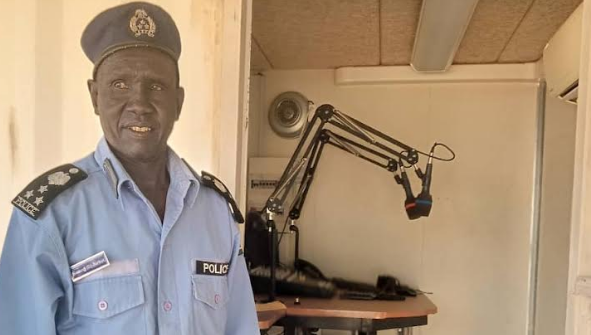Singaita 88.3 FM community radio in Kapoeta town in Eastern Equatoria State is back on air after it was reopened by security officials earlier today after being closed down last Friday.
On Friday evening last week, armed personnel from the National Security Service (NSS) stormed the radio station’s premises with padlocks and ordered the staff to shut down their computers before locking down studio and radio offices.
The closure prompted civil society organizations, the Toposa community, and the UN’s human rights in Torit to demand the unconditional reopening of the community radio station.
Singaita radio’s acting station manager, Karisio William Lonya, told radio Tamazuj on Friday morning that a team comprising police, local government officials, and national security officers came and officially reopened the radio station.
“Yes, for sure they have just opened it right now, some few five minutes. There were police, national security plus local government officials,” Lonya said. “Yesterday the (information) minister called me and said that a team will come to open the radio but they did not explain anything to us. They just came and told us that they received a message from the minister yesterday that is why they are here to open the radio. They did not explain anything beyond that.”
The inspector of police in Kapoeta town, Gen. Garang Deng Jorkuch, confirmed that the radio station was reopened. He explained that the station was closed because the radio did not cover an event by officials from the ministry of general education who visited in October to assess land for the Equatoria International University.
“I went myself and there were officials from the local government and an officer from national security,” Gen. Jorkuch said. “We went there this morning and we also told them to open the studio to confirm that everything was operational and everything is in place. The radio is now working.”
He added: “It goes back to the visit of education officials who came from Juba to assess the area where the University of Kapoeta is to be established. They (radio station) were invited to go to the airstrip for the officials to talk and give views but maybe they were not told in time. They were then told to go to the hotel where the education officials were accommodated but I think the (radio) staff did not go there.”
State information minister Patrick Oting Cypriano said he directed that the radio station be reopened but that there are issues that his office has to resolve with the Singaita FM management.
“I am aware, I sent the directives. It is an administrative issue and the CEO of Singaita FM is coming from Juba and the person who was in charge of Singaita FM will also be coming hopefully early next week and we will have to discuss with them a lot of things,” Minister Oting said. “So, we could not keep the radio closed for long because we have agreed it is an administrative issue. We are just remaining with a meeting to sort out some of the misunderstandings that arose from Singaita FM.”
The Union of Journalists of South Sudan (UJOSS) welcomed the reopening of Singaita FM saying it serves not only the people of Kapoeta with vital information but also the pastoral communities in neighboring Uganda and Kenya as well as providing job opportunities for UJOSS members.
“As the union of journalists, we are very happy about the reopening of the radio station and we appreciate the state for listening to our cry to talk to us when we were desperately trying to contact them,” UJOSS president, Oyet Patrick Charles, said. “I think that we will have to continue building good working relations between the authorities and journalists.”
He added: “We as journalists are not enemies, we are actually people who provide information which is supposed to help the public, and some of this information we get from authorities as well.”
Oyet urged the media and government authorities to resolve problems in amicable ways.




